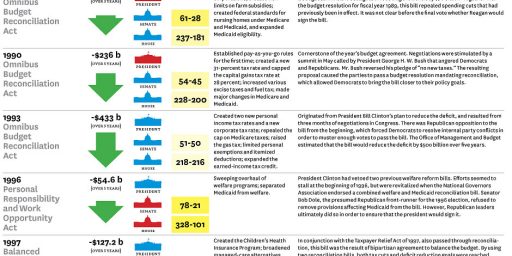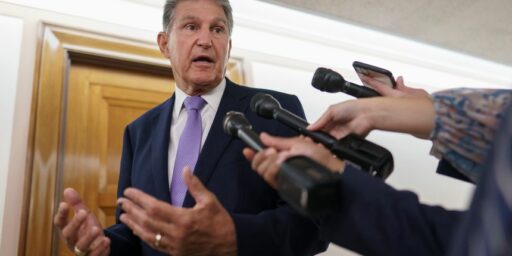Parties Play to Win the Game
Parties are in politics primarily to win the vote of the median voter, not to join together and sing Kumbaya.
In response to the op-ed version of Thomas Mann and Norman Ornstein’s new book, both Matt Steinglass and Kevin Drum go out of their way to hold Democrats blameless in the current state of affairs in Washington, typified by strong polarization between the two major parties. Drum claims:
[T]he truth is that both sides haven’t moved away from the center. Only Republicans have, and Democrats have spent the past 20 years chasing them in hopes that eventually they could reach some kind of reconciliation. But it never did any good. The Democratic move rightward was interpreted not as a bid for compromise somewhere in the middle, but as a victory for a resurgent conservative movement that merely inspired them to move the goalposts even further out.
This is, I suppose, a rather clever argument but it leaves out a major actor here: the voters themselves. As Republicans have been running to the right and (in Drum’s view at least) Democrats have struggled to keep up, the electorate has continued to give around the same share of the vote to each party and return roughly equal numbers of Democrats and Republicans to Congress, all resulting in very little tangible harm to the good of the nation as a whole, even if the old gentlemen’s agreement between the pre-Newt GOP and Democrats in Congress that the former would merely stand athwart history shouting “please slow down a little” has fallen by the wayside. If the voters are concerned about this state of affairs, thus far they’ve done remarkably little to show it—instead, they’ve been busily purging both parties’ moderates from Congress at most every turn.
More importantly, the idea that the Democrats have moved to the right in a bid for reconciliation and compromise is, in a word, risible. They’ve moved to the right, at least to the extent that they have done so (after all, there’s plenty of left-wing red meat like the “Buffett Tax” circulating in Democratic circles these days too), because Democrats representing swing districts in Congress—correctly, as it turns out—feared for their jobs in the face of a reinvigorated Republican opposition and voters angry about excessive government spending.
In the face of a public that has become more fiscally conservative in their orientation and more concerned about high gas prices than spotted owls, this is a perfectly sane, rational response by Democrats, but let’s not pretend that adopting positions formerly held by the Rockefeller Republicans is somehow part of a high-minded effort to restore comity to the halls of the Capitol and the broader republic.







Sorry Chris but I have a few problems with your post.
They are only objecting to government spending on “other” people not the public trough they feed from.
And about those high gas prices – they are here to stay and there is nothing even the Republicans can do about it. All these wonderful new energy sources are expensive to explore and produce – $100+ bbl oil is the new norm. People may not like it but that doesn’t mean it’s not real. Anyone Republican or Democrat who says they can do anything about it is a liar.
What part of the ACA was the moving the right party? I guess since the Democrats did not nationalize health care, some progressives will argue that the ACA is a moderate plan. Yet, giving the federal government 100% control for insurance companies, health care providers, and the practice of medicine is not really that conservative. Also eliminating the “insurance” (the actuarial aspects) from “health insurance” means that progressives have create a nationalized version of generational-based, pre-paid healthcare.
Wait until the number of healthcare workers begins to significantly declines to see what progressives really believe about being moderate.
@Ron Beasley: Ron, I think you’re wrong. World demand for oil is high; thus if supply is increased, price will move toward equilibrium. Dollar price of oil is high because the value of the dollar has been eroded. Policies to strengthen the dollar will help in lowering the price. One of the best ways to strengthen the dollar is to restore our economy to a more vibrant state. The debt overhang needs to go away so that capital will be released in more productive directions. Because capital has been misallocated in recent years, ie. drawn to Wall Street to produce little of value except huge amounts of debt, our economy in real dollars has suffered. This all figures into the price of oil as the dollar has declined in value from the growing debt. Whichever party decides to stop playing their political games and honestly address the underlying “elephant in the room,” (debt overhang), the price of oil can come down.
That you think a ~30 percent back-up tax on million dollar incomes is “left-wing red meat” tells us what we need to know.
To seal the deal though, what rational compromise can succeed without ~30 percent tax on million dollar earners? Seriously. Tell us how much you’ll raise taxes on the 90 percent (and you’ll need to) and then tell us again how we have to avoid the Buffet rule at the same time.
(BTW, in theory both parties play for the center, but in practice is is a question of self-control. It is a question of how crazed you can become, ruminating on your own “red meat” questions. Right now one party is characterized by that, and it ain’t the Dems.)
@john personna:
I think both parties are controlled by the wings. They play to the center when they have to and hold their noses while doing it.
But conservatives do have an advantage because there are simply more of them. So progressive Democrats have to compromise more than conservative Republicans by virtue of the numbers.
@Andy:
Apparently conservative Republicans can’t do math?
… but we already knew that.
The problem with self-identification questions of this type is that it reduces to “judging a population relative to itself.” It is similar to the contradiction “America is a right-leaning nation.” You can’t, mathematically, have a population “right” or “left” of it’s own center. That is a mathematical contradiction.
(Also note that 40% is not a majority, even if those folks were correctly identifying themselves (magically) relative to the true US mean.)
@john personna:
I think you prove my point – the mathematical “center” is a lot more to the right than folks like Kevin Drum would like to admit. And I think this explains why Democrats have to move more to the right of their liberal base than Republicans have to move left from their conservative base.
But you’re right that self-identification has some problems. This is a bit dated now, but I think it shows that ideology doesn’t fit inside neat partisan boxes depending on the specific issue.
Were Steinglass and Drum both locked away in frozen stasis during the period between Jan. 1993 and Jan. 1995 and then again from Jan. 2009 through Jan. 2011?
Those were the two periods within the past 20 years in which Democrats had complete power in D.C. During the former their desired agenda was Hillarycare, tax hikes, stepped-up federal environmental enforcement, a massive RIF for the military and publicly-subsidized abortions. During the latter their desired agenda was Obamacare, card check, cap & trade, nationalizing the banking sector, stepped-up federal regulatory schemes for the banking, securities, insurance and industrial sectors and substantially increased federal dominion over labor and employment law and related regulations.
Obamacare was enacted via reconciliation, literally on a party-line vote.
If those are indicative of moves to the “right” in order to foster “compromise,” then I’d sure as hell hate to see what would happen if the Democrats took a partisan turn to the left. Yikes.
The myth of the center persists despite the obvious fact that there is no center.
And how do we know this? Simple, if there was a center we wouldn’t be as polarized as we are today, period.
We want to believe that there is a center because we want to think of ourselves as reasonable, thoughtful and objective people – collectively, we’re not reasonable, thoughtful and objective at all.
Hilariously ignorance of pretty much everything that’s happened in Washington up to, about, the debt limit hostage crisis.
Democratic leaders, especially President Obama, have continually tried to make inroads and compromises with moderate Republican Senators like Olympia Snowe, Susan Collins and Scott Brown. Their olive branches have continually meet met with cloture votes.
@john personna: I think a 30% backup tax on rich people is the epitome of “red meat”: a symbolic gesture that would have virtually no effect on the deficit and could easily be avoided or substantially mitigated by most of its intended targets (two words: municipal bonds).
I’m not a Republican, but I’d support a responsible package of tax increases and budget cuts (particularly in defense discretionary spending), such as a carbon tax and/or a VAT that was partially offset by eliminating payroll taxes and included a refundable tax credit (based on the EITC) for the poor and elderly.
Political parties also, and perhaps most importantly, need to map out positions that can be succesful in the physical space in which elections are held, district by district, state by state. The Cook Report’s partisan index following Obama’s 2008 election indicates that the median Congressional district had a +2R slant. PDF Link The median state partisan leaning also appears to be +2R as well (FL & VA).
“As Republicans have been running to the right and (in Drum’s view at least) Democrats have struggled to keep up, the electorate has continued to give around the same share of the vote to each party and return roughly equal numbers of Democrats and Republicans to Congress, all resulting in very little tangible harm to the good of the nation as a whole”
I am not sure how you can say this and expect to be taken seriously. Whether the parties receive equal amounts of votes has little if anything to do with whether their policies do harm or good. If you disagree, please explain how you quantify this relationship.
@Moosebreath: I didn’t mean to imply causality in the statement (although now you point it out, I can see how it could be read that way), only that the result of this rightward shift seems to have had far more effect on breaking down the “beltway consensus” than it has had on the nation as a whole.
Chris makes two major mistakes here. The first is he assumes the electorate to be a rational actor. It is not.
The second is a claim that “both sides do it!” without any evidence, seen here:
they’ve been busily purging both parties’ moderates from Congress at most every turn.
The Democrats have not been doing this. Sure, a Dem here and there has seen support dwindle, but in most if not all cases this is not because that person is a moderate, but because he actively acts against his own party, attacking fellow Democrats and supporting Republicans. That’s not a moderate, that’s a damned turncoat.
@mantis: So, the reason so many Democrats lost their seats to Republican challengers is because those Democrats weren’t sufficiently loyal to the party?
Well that’s one way to look at it. Personally, I think elected politicians should serve the interests of their constituents and if that means they have to become a “turncoat” to party bosses, so be it.
@Andy:
When you say a “center is right,” compared to what?
That is the serious question. If you just mean the nation has moved right, I think most people would agree that both parties have done so. Which again returns us to “how can a center be right?”
FWIW, I think it’s used because it is a useful iteration for the further right. If you keep saying the center is right, rinse and repeat, the center moves. Again and again.
@Chris Lawrence:
Then it’s harmless? I think there might be a problem in that contradiction, that something absolutely cannot be passed as part of any tax overhaul because it is dangerous, and oh, it doesn’t really matter anyway. (I’m not sure that muni bond interest is exempt under the proposed rule.)
I’m appalled. None of those can be both effective and politically acceptable at the same time. Especially the “carbon tax and/or a VAT” nonsense.
IOW, you oppose the Buffet rules and prefer unicorns.
To really close the budget gap you have to cut spending severely, and you need to raise taxes across the board. The 30% Buffet rule would only be in-line with what was needed, across the board.
We have online budget simulations that illustrate that, as here
So, the reason so many Democrats lost their seats to Republican challengers is because those Democrats weren’t sufficiently loyal to the party?
We weren’t talking about Democrats losing to Republicans. We were talking about the base driving so-called RINOS and DINOS from their own parties, either with primary challenges or effectively forcing them to retire when they know they face a real struggle within their party. Do pay attention.
@Chris Lawrence:
That’s all well and nice, but only one party (Dems) is willing to entertain any of those. That would seem to support the idea that the Democratic Party is not anywhere near as extreme as the Republican Party.
@David M:
Actually David, Republicans love to talk about VAT in the abstract. Doing so is one of their favorite things. It is a tactic, of course, conscious or not. You see when you say “VAT” you don’t have to change current income tax rules at all. You just wave hands that a VAT will somehow fix it, the psychology of it even that it will fix it without seriously affecting the reader.
In fact, serous studies of how large a VAT would have to be are scary. Something like 10-20%? And covering food and medicine? Rent? etc.
A good quote here:
@Ron Beasley: voters worried about excessive spending when a Democrat is president. Otherwise it doesn’t matter. Is the author 12 years old?
If the voters are concerned about this state of affairs, thus far they’ve done remarkably little to show it—instead, they’ve been busily purging both parties’ moderates from Congress at most every turn.
Hardly at every turn. It’s more of a racheting effect. Dems run moderates in swing districts. In 2006 and 2008 many were elected (some replacing moderate reps). In 2010, Republican primaries eliminated moderate candidates, so the swing in swing districts replaced moderate Dem’s with conservative reps. Dem congressional majorities have always included a significant number of moderates. Rep majorities, not so much.
@john personna:
My point is that Drum thinks the center is further to the left than it actually is. He thinks, after all, that only Republicans, not Democrats have “moved away from the center.”
@Andy: I’m curious to hear how the Democrats have become more liberal or moved away from the center. As far as I can tell, that’s not the case on most issues. Gay marriage could be the exception I suppose, except that the GOP position seems to be the one out of the mainstream anymore.
@Andy:
I think the strongest indication that we are right of old center, all of us, is that the Dems are not asking to reverse Bush tax cuts. They aren’t asking to move back to Clinton era taxes. They certainly aren’t going back to Kennedy taxes.
Everyone has bought the right’s idea that you can tax everybody less and make it up on volume.
The whole nation will have to move “left” to actually balance the budget. That’s just reality. To prove otherwise, show me a budget put forward by anyone now that actually works. None of them do, from what I can tell. They all play in wonderland.
Obama’s budget is “right” because its taxes are too low.
He thinks, after all, that only Republicans, not Democrats have “moved away from the center.”
There is a lot of evidence for that.
In the early 90s, Democrats were trying to get single-payer healthcare. That failed, and now we have healthcare reform modeled after Republican alternatives to single payer that arose during that time and in Massachusetts under Romney.
Gun control is certainly no longer a priority for the Democratic Party.
Democrats no longer push to slash defense budgets like they used to.
Democrats supported the PATRIOT Act.
And on so many other issues, like welfare reform, oil exploration, education policy, crime, and many more, Democrats have moved to the right of positions they held in the 1980s or 90s.
Honestly, the only two areas I can think of where Democrats have moved left are gay rights and climate change. They also re-embraced financial regulation that they had decided wasn’t important until after the banks killed our economy in 2008, but even on that issue they are still to the right of where they were 20+ years ago.
If you think the Democratic Party has moved further to the left, you are delusional. If you think the Republican Party hasn’t moved further to the right, you’re insane. Just ask these two Republicans.
@mantis:
I believe that Cap-and-Trade on Carbon Emissions was originally a market-based approach favored by conservatives.
As with the Heritage Foundation-favored health insurance mandate – conservatives favored it until Democrats became proponents.
Clearly, you are not a Republican.
@al-Ameda:
Good point. Ok, one issue. 😉